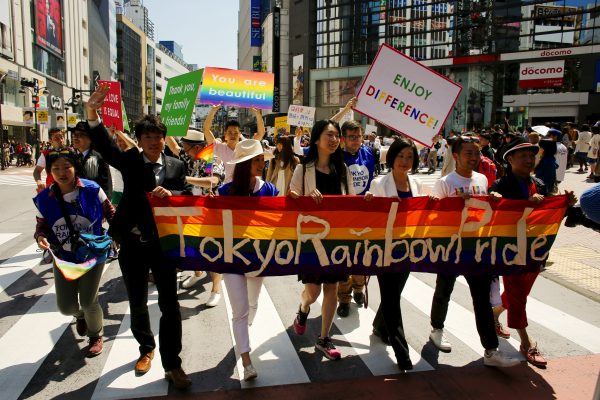The Keikan (sodomy) Code of 1872 is the only anti-homosexual statute Japan has had in its history. It was revoked shortly after by the 1880 Penal Code and today, Japan’s legal system largely ignores sexual minority issues, while not explicitly criminalising homosexuality.
As same-sex marriage is neither legalised nor prohibited at a national level, it has left urban governments with the opportunity to make their own decisions at the local level and ensure the enhancement of the community’s diverse lifestyles. Policymaking about LGBT rights has become rather localised in Japan.
Shibuya Ward in Tokyo led this change by adopting an ordinance-based same-sex partnership policy in March 2015. The local government sought to meet the needs of community diversity in an autonomous policy process with little interference from the national government. Generally speaking, local governments can pragmatically deal with policy problems in the immediate area. Some local actors, such as Shibuya Ward, have been able to identify this policy opportunity and adapt it to meet their locally specific needs without superseding the hierarchy of central–local government relations.
When taking the initiative for same-sex partnership, the policymakers of Shibuya took advantage of an ordinance-based legislative right given to local authorities. The enactment of the ordinance constrains the national government’s control over local discretion as long as the local enactment is consistent with national law. Shibuya Mayor Ken Hasabe successfully framed the issue of same-sex partnership by describing the tangible hardships faced by the minority groups — such as hospitals’ refusal to give visitation rights to their partners at intensive care units — rather than promoting it as a matter of abstract civil rights. His proposal gained strong support from the public and the Ward Assembly.
In Shibuya Ward’s case, there was no overarching ideological conflict such as that between secular and Christian morality in other areas. The formation of the same-sex partnership policy was largely determined by very specific factors involved in the impact of the certificate issuance on various stakeholders. The intention of the ordinance was not focused on the legal status of same-sex partnerships, but rather to promote the social recognition of these partnerships. Social recognition helps to shape values of the community and was expected to offer practical solutions to the everyday problems faced by same-sex couples, such as co-signing of tenancy agreements for rental housing and family-related employment benefits.
Yet future prospects for LGBT issues in Japan indicate the potential for the policy area to become highly salient and integrate concerns of morality into politics at the national level. As levels of public acceptance toward homosexuality continue to increase in Japan, groups opposed to LGBT rights such as Nippon Kaigi, are likely to expand the scope of the debate. Party politics could be dragged into the patterns of morality politics.
The transnational effects of LGBT movements are another equally important influence on policy change in Japan. Domestic LGBT groups are increasingly working with international non-governmental organisations such as the International Lesbian, Gay, Bisexual, Trans and Intersex Association (ILGA) and The OutRight Action International. These non-governmental organisations hold consultative status within the United Nations Economic and Social Council. They have held certain countries accountable for inaction, gaining leverage for policy change through their alliance with specialised UN agencies.
Japan is certainly prone to such international pressure and may well seek to maintain its international reputation through pursuing same-sex marriage legislation at the national level. The path to achieving marriage equality in Japan will depend in part on how this outside pressure interacts with an evolving domestic debate.
Yasuo Takao is a Senior Lecturer at the School of Media, Culture and Creative Arts at Curtin University, Perth.


Thanks for an informative analysis about an issue which does not get much attention in other media. I have one question and one comment.
Question: are other wards in Tokyo or other large cities in Japan considering the kinds of actions taken by Shibuya? If so, there could be a groundswell of movement towards marriage equality in Japan. It would probably be very gradual, however.
Comment: Nippon Kaigi is a very powerful force of conservatism to be reckoned with. As long as its members dominate the ruling Liberal Democratic Party’s policy making dynamics it is going to be an uphill battle to get any change on a national level when it comes to marriage equality, at best. PM Abe and his cohorts in the Cabinet have proven to be extremely conservative in their perspective on socially related issues.
Shibuya Ward’s adoption of a same-sex partnership policy in March 2015 was a landmark innovation. Rather than attempt to re-shape residents’ moral values by pushing for legalization of same-sex marriage, the Shibuya Ward government reframed the issue of LGBT rights as one of right to material benefits (e.g. co-signing for tenancy to live in the same housing, family visitation rights in hospitals, etc.) and began issuing “partnership certificates” that would allow for access to the same resources. Several other places have been inspired to adopt the same legislative approach (e.g. Takarazuka City, Setagaya Ward -Tokyo).